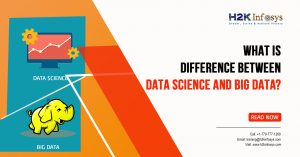Companies all throughout the world have long collected and analyzed consumer data in an effort to increase customer satisfaction and boost profits. We can collect enormous amounts of data in the modern digital environment, necessitating the use of unconventional data processing techniques and software.
A specialist in the analysis and interpretation of data is known as a data scientist. They assist firms in improving their operations and decision-making processes by applying their Data Scientist expertise. Most data scientists have a solid foundation in computer science, statistics, and mathematics. They examine huge data sets using this knowledge to look for trends or patterns. Furthermore, data scientists might create novel approaches to gathering and archiving data. To learn more, check out the Data science course online.
What Does a Data Scientist Do?
To find important insights and guide strategic decisions, a data scientist gathers, examines, and interprets data. They gather and purify data from several sources, use machine learning and statistical methods to build predictive models, and do exploratory data analysis to find trends.
Additionally, feature engineering, model assessment, and model deployment into production are critical tasks for data scientists. Their work cuts across industries, helping companies succeed by enhancing goods, streamlining operations, and implementing data-driven strategies. They play a key role in turning data into knowledge that can be put to use and spurs innovation and competitive advantage.
Data Analyst vs Data Scientist: What’s the Difference?
With the use of programs like Excel and SQL, data analysts concentrate on analysing data to find significant patterns and insights. They assist organisations in making defensible judgments by utilising historical data.
Conversely, data scientists possess a wider range of skills. They create algorithms and intricate predictive models in addition to data analysis. They create data-driven solutions, forecast the future, and extract deep insights using Python and R. To tackle challenging issues and spur innovation, they fill the gap between data analysis and machine learning.
Qualifications and Eligibility Required
You will require excellent analytical and mathematical skills to work as a data scientist. It should be possible for you to comprehend and handle complicated data sets. You should also know how to use statistical software tools and have some familiarity with Python or R programming languages. Additionally, most data scientists hold a certification from an authorised school.
How to Become a Data Scientist?
The field of study that deals with drawing conclusions from all of the collected data is called data science. Professionals who can help their firms get a competitive edge through data analysis are in high demand. As a data scientist, you will develop analytics and business solutions that are driven by data.
Step 1: Obtain a bachelor’s degree.
Obtaining a bachelor’s degree in a related discipline, such as computer science, statistics, or data science, is an excellent approach to getting started in data science. It is among the most popular requirements that employers have when selecting data scientists.
Step 2: Learn Relevant Programming Languages
You may have a theoretical understanding of the subject with a bachelor’s degree, but you still need to brush up on pertinent computer languages like SAS, Python, R, and SQL. When working with massive datasets, these languages are indispensable.
Step 3: Acquire Related Skills
A data scientist should be proficient in a variety of languages as well as a few technologies for big data, machine learning, and data visualisation. It is essential to understand how to handle, clean, sort, and analyse massive datasets while dealing with them.
Step 4: Earn Certifications
Certifications that are specialised in tools and skills are an excellent method to demonstrate your proficiency in these areas. Here are some excellent certificates to get you started:
- Tableau Certification Training Course
- Power BI Certification Course
These two are the most often used tools among specialists in data science, and they would be an ideal addition to begin your career.
Step 5: Internships
A fantastic approach to getting your foot in the door with firms employing data scientists is through internships. Look for positions with keywords like statistician, data engineer, data analyst, or business intelligence analyst. Another excellent method to see firsthand what a career actually entails is through an internship.
Step 6: Entry-Level Positions in Data Science
After your internship, you have two options: you can start looking for entry-level jobs as a data scientist, data analyst, or data engineer, or you can join the same firm if they are hiring. From there, you can advance in your career and obtain experience as you expand your knowledge and skills.
Conclusion
You can learn more about Data science by checking out the data science certification course.


























